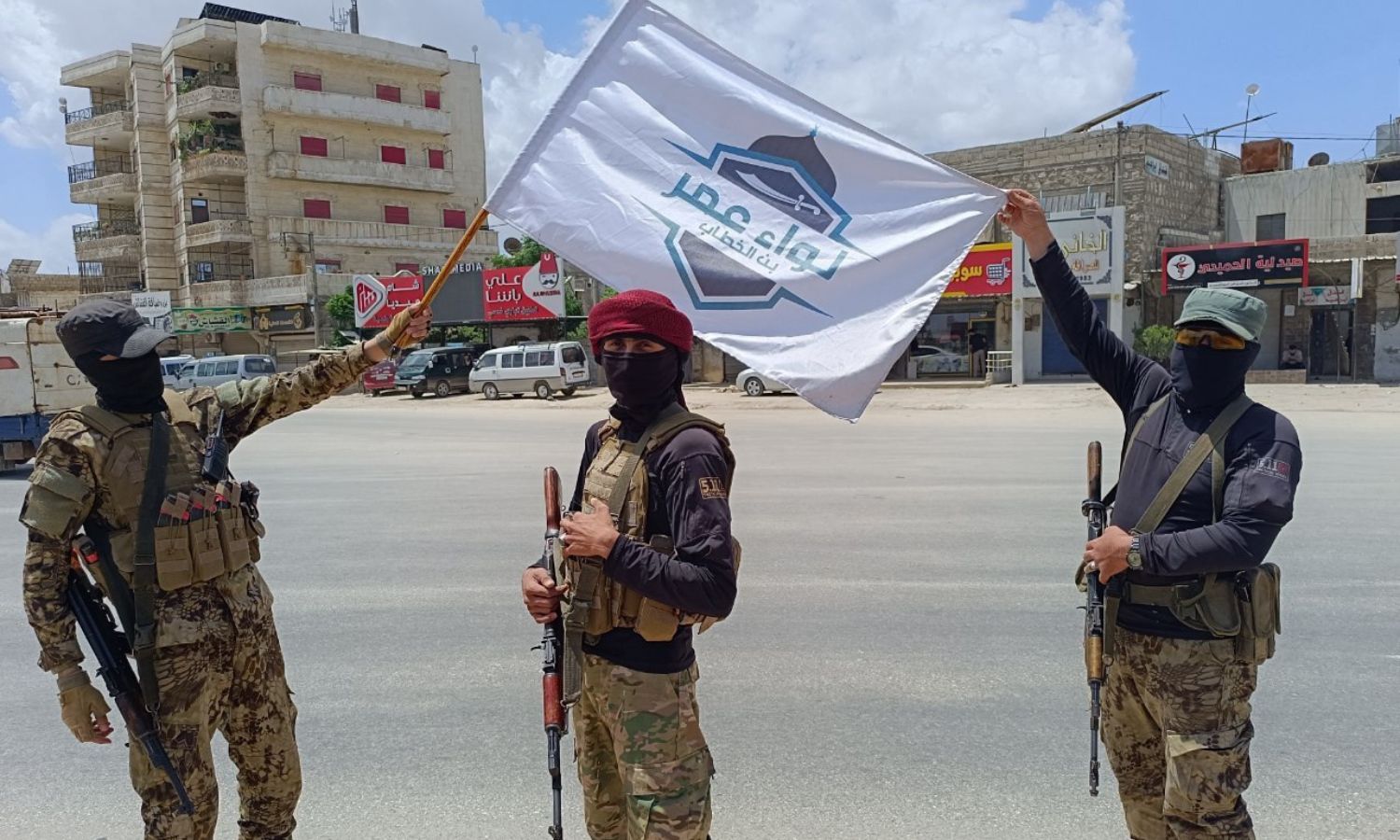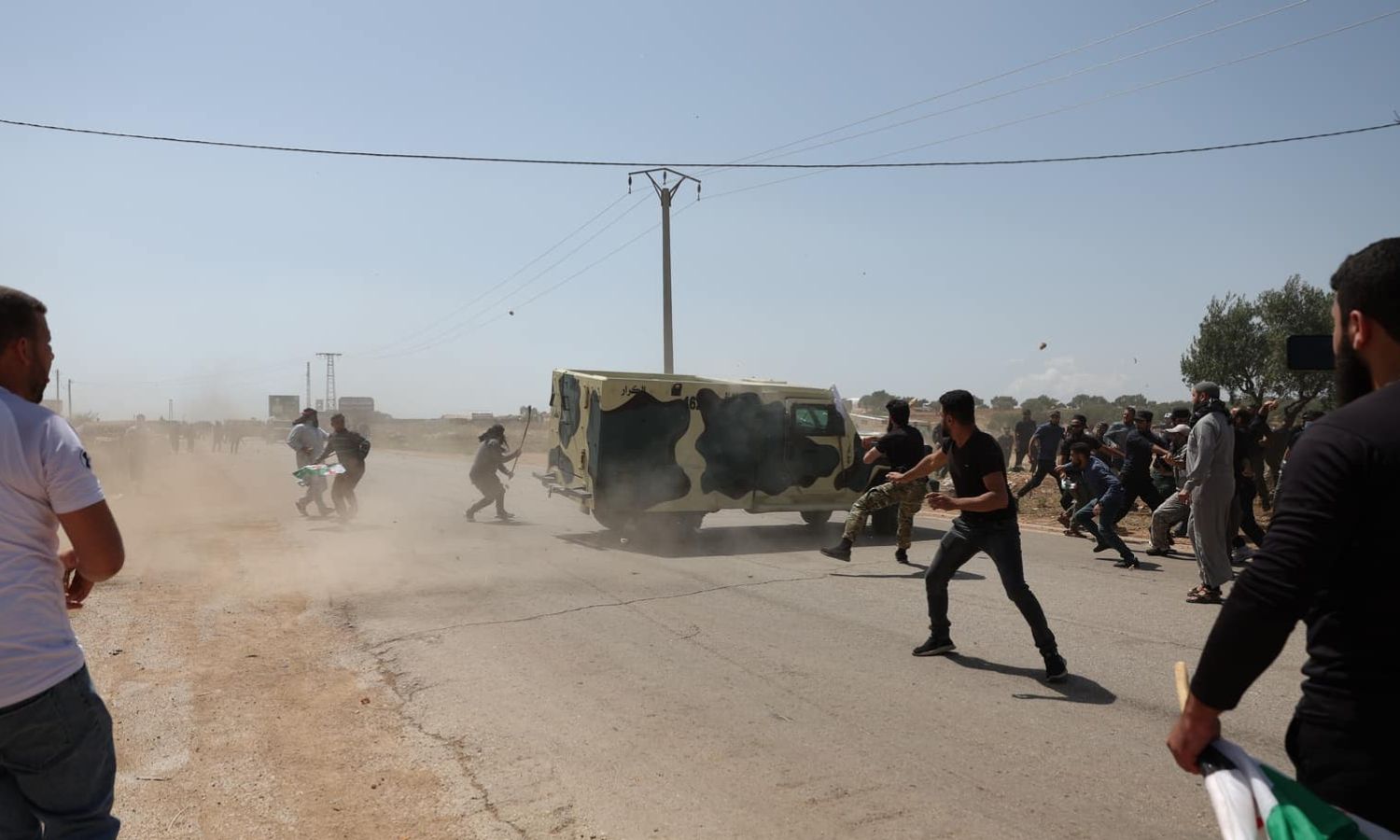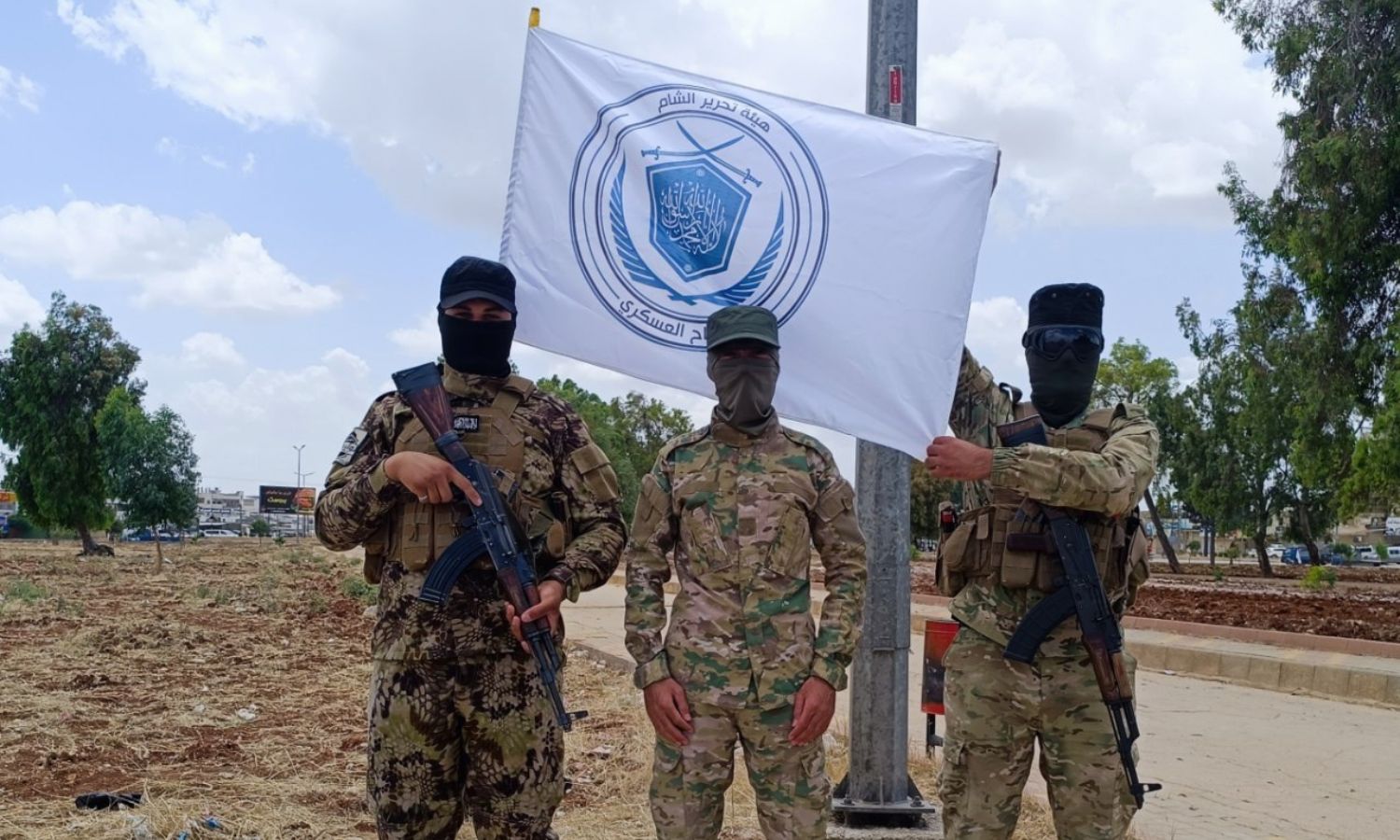



Enab Baladi – Hassan Ibrahim
The United States condemned the practices of Hayat Tahrir al-Sham (HTS) against peaceful demonstrators in Idlib, describing its handling of them as “intimidation and brutality” akin to the methods of the Syrian regime.
The US Embassy in Damascus said on Wednesday, May 29, that it condemns this approach against peaceful demonstrators who are demanding justice, security, and respect for human rights.
This comment comes after Tahrir al-Sham deployed its military forces in the streets since May 13 to confront the popular movement calling for the ousting of the faction leader Abu Mohammad al-Jolani and rejecting the policy of “monopolizing decisions.”
The HTS justified the military deployment by maintaining security and preventing chaos, subsequently witnessing assaults on demonstrators and launching a campaign of arrests against activists in the protest movement.
Al-Jolani warned the demonstrators not to “cross the red lines,” noting that the time for rightful demands had ended.
In response, Tahrir al-Sham replied to the embassy’s comment in a statement filled with messages, saying that it supports official institutions and the rule of law, emphasizing the importance of civil activities and their integration in building an aware society where rights and freedoms are respected under the umbrella of public interest and its regulations.
According to the statement issued on May 30, the northern areas provide a safe environment for expressing opinions, calling for improvements in the situation, and responding to legitimate demands through legal means, away from destabilizing and spreading chaos.
The statement added that Tahrir al-Sham has allowed for demonstrations and expressions within the bounds of respecting the freedoms of other segments of society and not interfering with or disrupting its institutions.
The statement also carried messages to Washington, stressing the need to support the Syrian people’s demands for freedom and dignity against the regime, and preserving the rights of student demonstrations in the United States and respecting their demands in support of Palestine and the people of Gaza.
Since the end of last February, Idlib city has witnessed a popular movement demanding the ousting of al-Jolani and the removal of the military from the core of institutions and civil life.
The protests were met with reforms by the HTS and its political umbrella, the Syrian Salvation Government (SSG), while demonstrators considered these reforms “superficial and shallow” and do not meet their main demands, seeing them as bypassing the fundamental demand.
On May 15, al-Jolani said that the HTS had used the “language of dialogue” over the past three months and has 50 “cards” that it hasn’t used any of, adding that “those who undermine the liberated area are undermined by us, and we won’t tolerate any person, group, party, or faction wanting to harm the liberated area.”
The cities of Binnish and Jisr al-Shughour witnessed incidents of assaults on demonstrators, attempts to run them over with military vehicles, and then the Salvation Government launched an arrest campaign against activists in the movement, saying they “practiced intellectual terrorism on legitimate demonstrators and worked to tarnish those seeking reform.”
For its part, the Revolutionary Movement Gathering stated that the detainees did not incite violence or the use of weapons, and were known for their peaceful and civilized demonstrations only.

Elements from Hayat Tahrir al-Sham clash with demonstrators demanding the ouster of faction leader Abu Mohammad al-Jolani in the city of Binnish, eastern Idlib – May 17, 2024 (Omar Haj Kadour/Facebook)
The attempts by Tahrir al-Sham to contain the protests peacefully have failed, as evidenced by the incident of forcibly dispersing a sit-in in central Idlib on May 13, assaulting protesters with hands and batons. The Salvation Government commented that the assault started from the demonstrators first, followed by incidents of assault in Binnish and Jisr al-Shughour on the 17th of the same month.
The failure of containment attempts and the shift to a military option were reinforced by al-Jolani’s remarks on May 15 when he said that the demands had deviated from their true path and that Idlib had entered a new phase.
Syrian political researcher Nader Khalil believes the US embassy’s statement may have limited but potential impacts as it contributes to increasing international pressure on Tahrir al-Sham. However, it might not be sufficient to radically change its behavior, especially since Tahrir al-Sham is classified as a “terrorist” organization and the US lacks effective pressure tools against it.
Khalil told Enab Baladi that the embassy’s statement could influence the HTS internally, possibly enhancing divisions within the faction itself, as some members might desire to adopt less violent and more conciliatory tactics to avoid international criticism.
Nevertheless, HTS’ primary focus remains on maintaining security and using violence and arrests as main means to control the situation and prevent the protests from turning into a real threat to its authority, according to Khalil.
On the other hand, international statements often have limited impact when it comes to armed groups, especially in a context like Syria. However, this does not mean the statement is unimportant, as it may encourage local residents and civil society to continue protesting and demanding reforms, increasing pressure on Tahrir al-Sham and making it harder to ignore popular demands, according to the researcher.
I don’t think the US Embassy’s statement in Syria on Tahrir al-Sham’s handling of demonstrators will change its anti-protest tactics. The priority for the latter’s leadership is to suppress the protest movement so that it does not turn into a threat to its authority.
Nader Khalil – Political Researcher
Khalil noted that the HTS varied its tactics between calls for dialogue, attempts to create gaps and divisions among movement leaders, promises of reforms, and security and military tactics, such as arrests and forceful dispersal, and preventing large gatherings of demonstrators.
In contrast, the US doesn’t possess effective pressure tools on the HTS, as it is already listed as a “terrorist” group, and its leader is wanted by the US. Therefore, the leadership’s priority will be to curb the evolution of the protest movement, according to Khalil.

Deployment of Hayat Tahrir al-Sham fighters in the main streets of Idlib – May 24, 2024 (Idlib News)
Hayat Tahrir al-Sham originated in Syria under the name Jabhat al-Nusra (Al-Nusra Front) at the end of 2011. This faction is distinguished by its emergence from al-Qaeda, one of the most prominent “jihadist” factions on the global stage. It later announced its separation from any organization and considered itself a local Syrian force.
HTS is still listed as a terrorist organization, and al-Jolani remains on America’s wanted list, with a reward of up to ten million US dollars for information leading to him.
Researchers and governance experts, in a previous report prepared by Enab Baladi, explained that, broadly speaking, the governing system in Idlib can be described as a presidential system in all executive, legislative, and military channels. This stems from the influence of Abu Mohammad al-Jolani, who is seen to hold complete control of decision-making processes.
if you think the article contain wrong information or you have additional details Send Correction